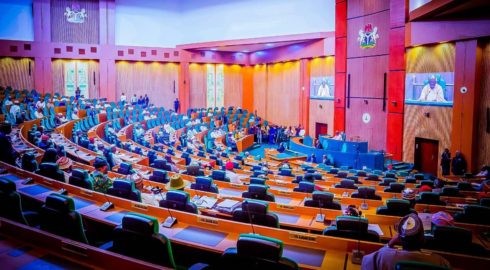The House of Representatives has rejected the proposal to confer the Commander of the Federal Republic (CFR) title on Tajudeen Abbas, the current Speaker of the House. The decision was reached after an intense debate during a plenary session, with members offering divergent opinions on the matter. The motion to honor Abbas with the CFR title had been brought forth as a gesture of recognition for his leadership contributions to the House.
However, a majority of lawmakers argued against the move, emphasizing that the prestigious title should be reserved for individuals who have made extraordinary contributions to the nation. Several members called for a more comprehensive review of the criteria for awarding national honors, stressing the importance of upholding the dignity associated with these titles.
House of Representatives Calls for Amending the Constitutional Order of Protocols
One of the key issues raised during the debate was the need for amendments to the constitutional order of protocols. Some members of the House of Representatives argued that the current protocol, which recognizes the Vice President as the second-highest-ranking official, should be revised. They proposed that the Speaker of the House and the Senate President should be elevated in the order of precedence, reflecting their significant roles in the legislative process.
Lawmakers supporting this change emphasized that the Speaker and Senate President play vital roles in shaping national policy and governance. They suggested that recognizing them as the nation’s third citizens would provide a more balanced representation of the three arms of government.
Abolishing the Distinction Between Upper and Lower Chambers
During the session, another bold recommendation was made: to abolish the distinction between the Upper and Lower Chambers of the National Assembly. Advocates of this idea argued that the separation between the Senate and the House of Representatives creates unnecessary bureaucracy, leading to legislative delays. By merging both chambers, they claimed, the legislative process could be streamlined, ensuring more efficient governance.
Critics, however, pointed out that such a merger could undermine the system of checks and balances, which the bicameral structure is designed to preserve. The proposal remains divisive, with some lawmakers calling for a more detailed examination of its potential impacts.
House Recommends Screening and Approval of Ministerial Appointments
A notable suggestion made during the deliberations was that the House of Representatives should be tasked with screening and approving ministerial appointments, a responsibility currently held by the Senate. Proponents of this idea argued that the House, with its larger and more diverse representation, is better positioned to carry out a thorough vetting process for ministerial candidates.
Supporters also contended that allowing the House of Representatives to participate in this process would foster greater accountability and transparency in the appointment of government officials. Opponents, however, expressed concerns that this could lead to power struggles between the two chambers and complicate the confirmation process.
Proposal to Award Speaker GCON Title Sparks Debate
Another proposal that sparked significant debate was the suggestion to honor the Speaker of the House with the Grand Commander of the Order of the Niger (GCON) title, a prestigious honor typically reserved for Vice Presidents and high-ranking officials. Advocates for this change argued that the Speaker’s position warrants such recognition, given the Speaker’s influence in shaping legislative decisions that affect the entire country.
However, some members of the House were skeptical about this proposal, cautioning that awarding such titles should be based on merit and not on the office held. They stressed the need to maintain the integrity of national honors, ensuring that they are not awarded arbitrarily.
A Divisive Yet Thought-Provoking Debate
The session concluded with a mixed outcome, as lawmakers were unable to reach a consensus on many of the proposals discussed. While the House of Representatives ultimately rejected the motion to award the CFR title to Speaker Tajudeen Abbas, the discussions highlighted the need for broader constitutional and legislative reforms.
As the nation continues to grapple with issues of governance and representation, these debates underscore the ongoing challenges of balancing tradition, protocol, and the evolving roles of public officials in Nigeria’s democratic system. It remains to be seen how these proposals will shape future legislative discourse.
Table of Contents
Discover more from OGM News NG
Subscribe to get the latest posts sent to your email.














